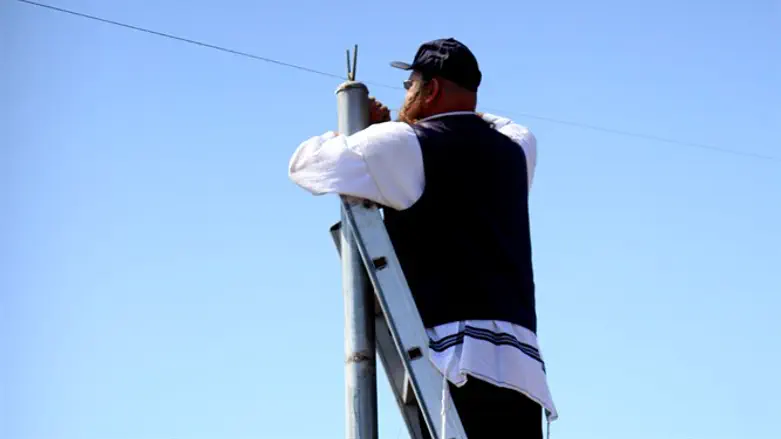
JTA - An Orthodox Jewish group has sued a town in New Jersey for ordering it to remove an 'eruv (halakhic boundary) from utility poles in the town.
The Bergen Rockland Eruv Association and two residents of Rockland County on Friday filed a federal lawsuit against the town of Mahwah, New Jersey, saying the town is violating their constitutional and civil rights.
Mahwah, which is located across the New York state border, had told the South Monsey Eruv Fund to remove the white plastic piping from utility poles that it uses for the symbolically enclosed area by Aug. 4. An eruv, usually in the form of a string or fabric piping stretched around a neighborhood, allows observant Jews to carry objects and push strollers outside of their homes on Shabbat by changing the open public sphere, where carrying is forbidden, into a boundaried one.
The Orthodox community told The Associated Press last month that it had been given permission to hang the piping by the local utility company. But town officials said the piping is banned because it is considered signage.
Town officials told the Associated Press that the town will start issuing summonses by next week if the piping, called a lechi for the purpose of the eruv, is not removed.
“The object, motivation and effect of the actions of the township is to suppress the religious practices of the plaintiffs and certain other Jews who reside in Airmont and other parts of Rockland County (in New York),” the lawsuit states, according to AP. “The eruv presents no aesthetic, safety, traffic, fiscal or other concern to Mahwah.”
Town Mayor Bill Laforet has called on the council to hold off on issuing summonses and to instead negotiate with the eruv group. He said a legal fight over the eruv could be costly for the city, the AP reported.
More than 1,200 people signed an online petition which is now closed that called for the eruv to be taken down. Many of the dozens of comments accompanying the petition, titled “Protect the Quality of our Community in Mahwah,” refer to “these people” and express concerns about falling property values. Most of them are anonymous.
“I don’t want these rude, nasty, dirty people who think they can do what they want in our nice town,” one of the comments reads.
Another says: “I do not want the town of Mahwah to turn into an undesirable place to live. These people do not assimilate with other people outside their community. I do not want them controlling our school board and siphoning funds for their yeshivas. Also, they buy houses which they claim is for religious purposes and do not pay taxes. They should stay where they are and leave our town alone.”